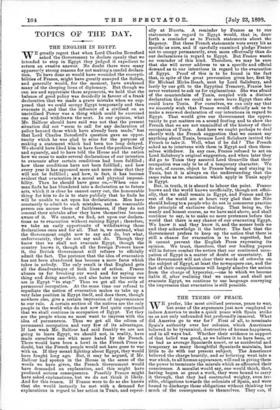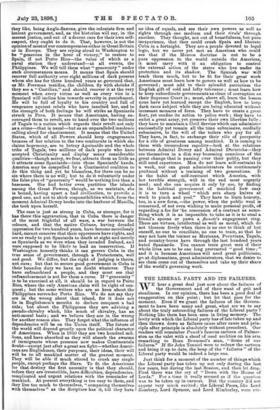THE TERMS OF PEACE.
WE prefer, like most civilised persons, peace to war, but some of the arguments just now employed to induce America to make a quick peace with Spain strike us as not only unfounded but profoundly immoral. What did America go to war for ? First of all, to terminate Spain's authority over her colonies, which Americans believed to be tyrannical, destructive of human happiness, and in all ways bad. Whether their evidence in support of that belief was good, as we believe it to have been, or as bad as average Spaniards assert, or as accidental and temporary as many thoughtful Spaniards maintain, has little to do with our present subject. The Americans believed the charge heartily, and so believing went into a war which, to all human appearance, will end in giving them the power to terminate the misrule which so affronted their consciences. A moralist would say, one would think, that, having begun BO great a work, they were bound to carry it through, that they had contracted weighty, even ter- rible, obligations towards the colonists of Spain, and were bound to discharge those obligations without thinking too much of the consequences to themselves. They can, if they like, being Anglo-Saxons, give the colonists firm and lenient government, and, as the historian will say, in the merest justice, and out of a decent care for their own self- respect, they ought to do it. That, however, is not the opinion of most of our contemporaries either in Great Britain or in Europe. They are crying aloud to Washington to be "generous in the hour of victory," to restore to Spain, if not Porto Rico—the value of which as a naval station they understand—at all events, the Philippines. We will tell them what " generosity " under such circumstances means. It means that Spain should recover full authority over eight millions of dark persons whom she has for three hundred years so governed that, as Mr. Foreman testifies, the children fly with shrieks if they see a "Castilian," and should recover it at the very moment when every virtue as well as every vice in a Spaniard will incline him towards severity in punishment. He will be full of loyalty to his country and full of vengeance against rebels who have insulted her, and in the strength of both feelings he will strike as Spaniards struck in Peru. It means that Americans, having en- couraged them to revolt, are to hand over the two millions of Tagals to a nation which regards their revolt not only as a crime—that is usual—but as an unparalleled insolence calling aloud for chastisement. It means that the United States, which of all Powers should keep engagements because of her relation to the two continents in which she claims hegemony, are to betray Aguinaldo and the whole tribe of Tagals, two millions of dark people who have accepted Christianity and display many considerable qualities—though mercy, we fear, attracts them as little as it attracts some Spaniards—into those Spaniards' hands. America may be compelled by a Continental coalition to do this thing and yet be blameless, for there can be no sin where there is no will ; but to do it voluntarily under the false plea of "generosity" would be nothing less than a baseness. She had better even partition the islands among the Great Powers, though, as we maintain, she is bound, having upset a bad civilisation, to provide a good one, and not to shirk responsibilities which, from the moment Admiral Dewey broke into the harbour of Manilla, she took upon herself.
The case is just as strong in Cuba, or stronger, for it has there this aggravation, that in Cuba there is danger of the most frightful of all wars, a war between the colours, and that the native Cubans, having dreaded oppression for two hundred years, have become mercilessly hard, cannot conceive that their oppressors have rights, and are as ready to put Spaniards to death at sight and merely as Spaniards as we were when they invaded Ireland, and were supposed to be likely to lead an insurrection. If Washington honestly thinks it can govern Cuba in the true sense of government, through a Protectorate, well and good. We differ, but the right of judging is theirs, not ours ; but that to secure good government in Cuba is their beunden duty we have no doubt whatever. They have enfranchised a people, and they must see that enfranchisement is not for them a curse. If "generosity " is to be exercised at all, it should be in regard to Porto Rico, where the only American claim will be right of con- quest ; but the same writers who are so keen about the Philippines surrender Porto Rico. We do not say they are in the wrong about that island, for it does not lie in Englishmen's mouths to declare conquest a bad title; but about the Philippines they are advising a pseudo-chivalry which, like much of chivalry, has an anti-moral basis ; and we believe they are in the wrong for another reason also. They forget what the influence of dependencies will be on the Union itself. The future of the world will depend greatly upon the political character A Americans. When in 1950 they are two hundred mil- hone, and have absorbed as they will absorb the swarms of immigrants whose presence now makes Continentals doubt—except just after a great sea fight—whether Ameri- cans are Englishmen, their purposes, their ideas, their will will be to all mankind matter of the gravest moment. They will be able if much stirred to crush any single people, except perhaps the Slays. To fit the Americans for that destiny the first necessity is that they should, before they are irresistible, have difficulties, dependencies, complicated and urgent relations with the remainder of mankind. At present everything is too easy to them, and they live too much to themselves, "comparing themselves with themselves" as the Scripture has it, till they have no idea of equals, and see their own powers as well as rights through one medium and their rivals' through another. They thought, not out of boastfulness, but pure inexperience, that they could crush Spain and liberate Cuba in a fortnight. They are a people devoted to legal logic, but we never yet met an American who could see that if the Monroe doctrine is not to be a pure oppression to the world outside the Americas, it must carry with it an obligation to control the external action of the states who live under its protection and its shadow. The Spanish war will teach them much, but to be fit for their great work Americans must learn how to govern as well as how to be governed ; must add to their splendid patriotism the English gift of cold and lofty tolerance ; must learn how to keep subordinate governments as clean of corruption as their Supreme Court is ; must, above all, learn the lesson none have yet learned except the English, how to keep dark races subject while they are being educated without incessant menaces of force. They have to create a great fleet, yet confine its action to police work ; they have to enlist a great army, yet preserve their own liberties fully ; they have to maintain a Civil Service which can administer successfully yet remain all the time submissive, cordially submissive, to the will of the toilers who pay for all. They have, in fact, to exchange their role of prosperity for a role of greatness among mankind. It is coming to them with tremendous rapidity—look at the relations between Admiral Dewey and Admiral Dieterichs—they are themselves in a dim way becoming conscious of the great change that is passing over their polity, but they still need experience. Men do not learn self-restraint in a week, nor can great administrators be continuously produced without a training of two generations. It is the habit of self-restraint which America, with her terrible strength, will in the end most urgently need ; and she can acquire it only by use, by finding in the habitual government of mankind how easy it is to turn a wheel "which sets sharp knives at work to pinch and peel." They have to learn honesty, too, in a new formy—the power, when the public weal ia concerned, of not even wishing to make personal profit, of regarding a fee for he concession of a contract as some- thing which it is as impossible to take as it is to steal a friend's spoons or pawn a fiancée's engagement ring. There are virtues, intellectual as well as moral, which do not blossom freely when there is no one to think of but oneself, no one to conciliate, no one to train, so that he may not hate the trainer as Mexicans, Peruvians, Tagals, and country-borne have through the last hundred years hated Spaniards. You cannot train great men if their whole lives are to be one long protracted "good time ; " and it is because Americans will need great politicians, gn at diplomatists, great administrators, that we desire to see them come out of themselves and take up their share of the world's governing work.



































 Previous page
Previous page